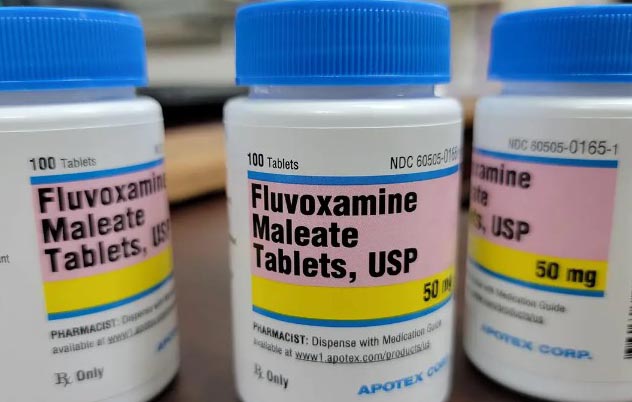Study reveals that SSRIs like Fluvoxamine worsen outcomes in hospitalized COVID-19 patients
James Josh Fact checked by:TMN Aug 16, 2024 1 year, 5 months, 4 weeks, 15 hours, 11 minutes ago
A recent study conducted by researchers from the University Hospital Dubrava, Zagreb-Croatia, General Hospital of Šibenik-Knin County-Croatia, and the University of Zagreb has unveiled concerning findings regarding the use of selective serotonin reuptake inhibitors (SSRIs) such as Fluvoxamine in hospitalized COVID-19 patients. The study suggests that these commonly prescribed antidepressants may not only fail to protect patients but may actually worsen their condition, particularly in those with underlying cardiovascular issues.
 Study reveals that SSRIs like Fluvoxamine worsen outcomes in hospitalized COVID-19 patients
Thailand Medical News
Study reveals that SSRIs like Fluvoxamine worsen outcomes in hospitalized COVID-19 patients
Thailand Medical News has been warning against the usage of fluvoxamine to treat COVID-19 in whatever stages of infections and irrespective of disease severity for a while now.
https://www.thailandmedical.news/news/study-finds-that-sars-cov-2-activates-ire1alpha-xbp1-arm-of-the-unfolded-protein-response-and-that-fluvoxamine-was-not-effective-in-covid-19
https://www.thailandmedical.news/news/covid-19-news-thai-study-shows-that-fluvoxamine-does-not-prevent-deterioration-in-mild-to-moderate-covid-19
https://www.thailandmedical.news/news/breaking!-covid-19-drugs-columbia-researchers-find-that-serotonin-and-ssri-drugs-like-fluvoxamine-can-cause-heart-valve-disease
https://www.thailandmedical.news/news/utah-study-validates-that-selective-serotonin-reuptake-inhibitors-ssris-such-as-fluoxetine-or-fluvoxamine-do-not-reduce-covid-severity
https://www.thailandmedical.news/news/world-health-organization-issues-warning-against-the-use-of-fluvoxamine-and-colchicine-to-treat-covid-19
https://www.thailandmedical.news/news/most-who-have-been-exposed-to-the-proteins-of-the-sars-cov-2-virus-will-have-shortened-lifespans-stop-using-fluvoxamine-for-ba-2-infections
Challenging Earlier Assumptions
The COVID-19 pandemic has led to extensive research on potential treatments and inte
rventions. SSRIs, which are widely used to treat depression and anxiety, were initially thought to have protective effects during acute SARS-CoV-2 infections due to their anti-inflammatory properties. However, this new study challenges those earlier assumptions by demonstrating that SSRI use among hospitalized COVID-19 patients is associated with poorer outcomes.
The Study at a Glance
The researchers conducted a retrospective analysis of data from 1,558 hospitalized COVID-19 patients, of whom 78 (5%) were exposed to SSRIs during their hospital stay. The study aimed to compare the outcomes of SSRI users with those who did not use these medications. Importantly, the researchers ensured that both groups were comparable in terms of demographic characteristics, comorbidity profiles, and the severity of COVID-19 symptoms at the time of admission.
Key Findings
The results of the study were alarming. After adjusting for various clinically significant factors, the researchers found that SSRI use was significantly associated with higher risks of severe outcomes, including death, the need for mechanical ventilation, intensive care unit (ICU) treatment, and bacteremia. Notably, there was no significant relationship between SSRI use and the risk of venous or arterial thrombosis or major bleeding.
The study also identified specific patient subgroups that were particularly vulnerable to the negative effects of SSRIs. Patients who initially presented with less severe COVID-19 symptoms, had a lower inflammatory burden, higher platelet counts, lower cumulative comorbidity burden, or had cardiovascular conditions such as hyperlipidemia, atrial fibrillation, or chronic heart failure, were at a higher risk of mortality associated with SSRI use. Furthermore, patients who were not exposed to acetylsalicylic acid (aspirin) appeared to be more susceptible to these adverse outcomes.
Implications for COVID-19 Treatment
These findings have significant implications for the treatment of COVID-19, particularly for patients who are already on SSRI medications. The study suggests that healthcare providers should exercise caution when prescribing SSRIs to hospitalized COVID-19 patients, especially those with pre-existing cardiovascular conditions. The potential for SSRIs to exacerbate respiratory deterioration and increase the likelihood of ICU admission and bacteremia calls for a re-evaluation of their use in this patient population.
Conclusion
In conclusion, the study conducted by the Croatian research teams highlights the need for a careful reassessment of the role of SSRIs in the treatment of COVID-19. While these medications are essential for managing mental health conditions, their use in hospitalized COVID-19 patients, particularly those with cardiovascular comorbidities, may do more harm than good. As the medical community continues to seek effective treatments for COVID-19, this study serves as a crucial reminder that not all existing medications are suitable for every patient population.
The findings of this study emphasize the importance of individualized treatment approaches and suggest that further research is needed to fully understand the potential risks and benefits of SSRIs in the context of COVID-19. As always, patients and healthcare providers should engage in open and informed discussions about the best course of treatment.
The study findings were published in the peer reviewed journal: Pharmacology (Karger).
https://karger.com/pha/article-abstract/doi/10.1159/000540008/911017/Negative-prognostic-associations-of-selective
For more updates on this and other COVID-19-related studies, visit
Thailand Medical News for the most recent developments.
Read Also:
https://www.thailandmedical.news/news/usage-of-proton-pump-inhibitors-associated-with-higher-risk-of-susceptibility-to-influenza-pneumonia-and-covid-19
https://www.thailandmedical.news/news/german-study-finds-that-antibiotic-use-in-hospitalized-covid-19-patients-offers-no-beneficial-clinical-outcomes 